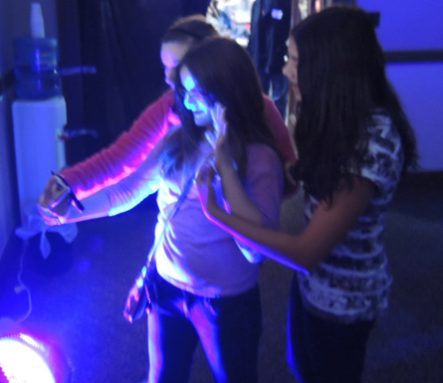Teachers: ‘Cafés’ offer teens a quick sip of science
CHICAGO — Mention science cafés to someone familiar with them, and a scientist lecturing to a bar full of adults will likely come to mind. But an early-morning session, February 16, at this year’s American Association for the Advancement of Science annual meeting showcased a very different type of event. Instead of adults listening to a speaker over pints of beer, I saw a gaggle of teens screaming as they ran from a man in a gorilla suit. It was all in the name of learning science.
Michelle Hall showed the picture as part of her talk on Teen Science Cafés. President of Science Education Solutions Inc., in Los Alamos, N.M., she was showcasing the youth version of bar-style science outreach. This is where teens gather to learn from and participate in informal activities with researchers. Some groups bring kids together in museums. Others assemble at activity centers, pizza parlors, churches — anywhere but in the classroom. In each case, teens walk away after having met a STEM professional face-to-face and learning a bit more about how science, technology, engineering and math might be relevant to their lives.
Hands-on activities are crucial. Researchers work hard to prepare an engaging presentation. Teaching about plant ecology? Give a “Hunger Games”-themed talk with a nature walk to identify local flora. Are you an epidemiologist? Describe how zombies might take over the Earth, with games to show kids how diseases spread in a population. The man in the gorilla suit was part of a talk given by Roland Kays. A zoologist at North Carolina State University in Raleigh, N.C., he studies how and why animals move. Kays had a volunteer chase students around in a gorilla suit and had the students follow certain rules, to show them how animals flock.

Noe had some of students attend the session over the Internet, to describe their work as leaders in their local science cafés. Senior Courtney Vishy at Francis Howell North High School in St. Charles, Mo., is a leader at the Gateway Teen Science Café in St. Louis, Mo. She says that she enjoys the responsibility. “I can share my passion for science,” she explains, “and show people that they can love science too.”
The idea for teen science cafés was born in 2007 after the National Science Foundation gave Hall’s group a grant. The $990,000, 3-year award helped kickstart Teen Café Scientique in northern New Mexico. Now there is a network of 13 organizations across the country giving teens an alcohol-free taste of bar-style science. Their site offers resources, guidance and best practices for a successful program, from how to format a presentation to making sure there is enough pizza to go around.
Noe emphasizes that anyone can join the network and start a local teen café. So consider launching your own program to teach kids that there’s so much more to science than textbook-driven lectures and homework.
Power Words
ecology A branch of biology that deals with the relations of organisms to one another and to their physical surroundings. A scientist who works in this field is called an ecologist.
epidemiologist Like health detectives, these researchers figure out what causes a particular illness and how to limit its spread.